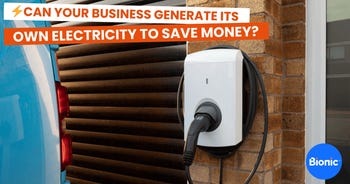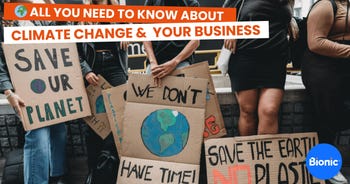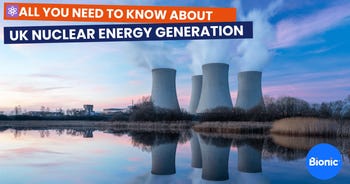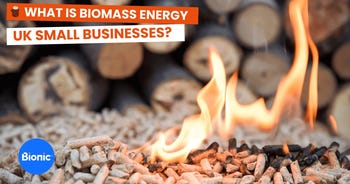What are renewable energy certificates, and how can they benefit your business?
In the UK, the main renewable electricity certificates are Renewable Energy Guarantees of Origin (REGOs) and legacy Renewables Obligation Certificates (ROCs). These sit alongside other environmental certificates and offsets used in business energy tariffs.
But these certificates aren't always as they seem. While the certificates aim to prove environmental claims and promote renewable energy, they are sometimes used for Greenwashing, where customers are misled by a business's environmental claims (more on that later).
Let's take a closer look at RECs, REGOs, and everything else related to renewable energy certificates.
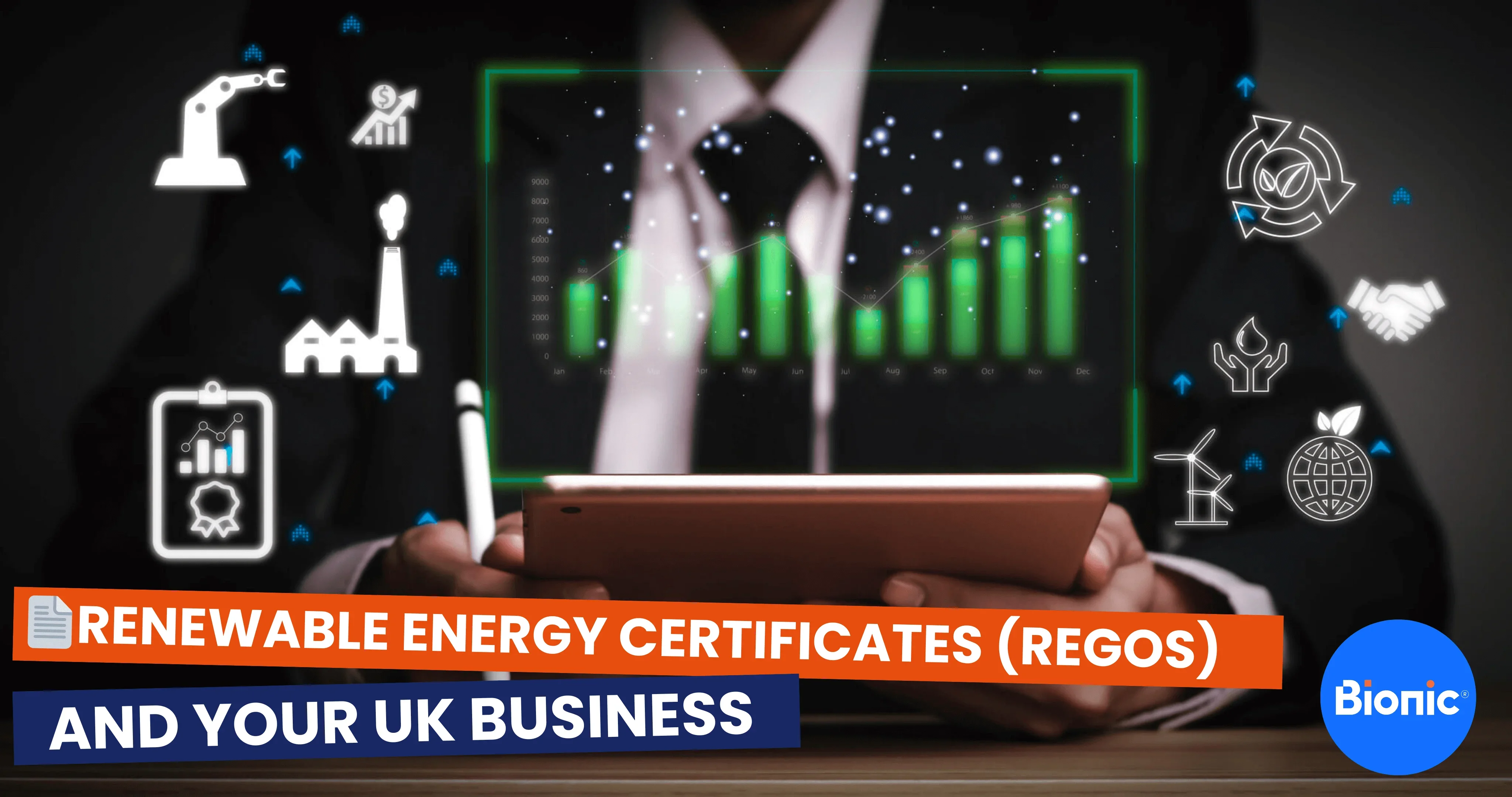
Five-point summary of our guide to Renewable Energy Certificates
- Renewable energy certificates (RECs), such as REGOs and ROCs, are electronic proofs that a megawatt hour of electricity was generated from eligible renewable sources and placed on the UK grid.
- Because all electricity mixes once it enters the grid, REGOs and other RECs act as tracking and accounting tools rather than separate “green” electrons, helping suppliers and businesses evidence renewable sourcing and report lower Scope 2 emissions.
- Businesses can access renewable energy via supplier green tariffs backed by REGOs or, in some cases, by buying standalone certificates, but this can lead to greenwashing if fossil‑fuel power is simply rebadged as “100% renewable”.
- RECs support growth in the renewable energy market, but recent price spikes and then crashes in REGO values have raised questions about transparency, additionality and whether some tariffs deliver real‑world emissions cuts.
- UK SMEs can still use REGOs responsibly by checking supplier fuel mix disclosures, Ofgem’s Renewable & CHP Register and third‑party accreditations, and by combining credible green tariffs with genuine on‑site reductions such as solar, efficiency upgrades and demand management.]
What are renewable energy certificates?
Renewable energy certificates (RECs) aim to increase the accountability and transparency of renewable energy production. They are electronic certificates issued to energy generators to prove that electricity has come from a renewable source such as wind or solar power.
Energy suppliers use RECs to demonstrate to their customers how much of the energy they supply is from renewable sources.
RECs can also help to validate a business's ESG — short for Environmental, Social and Governance — credentials and Corporate Social Responsibility policy, which both demonstrate the efforts of an organisation to consider its environmental impact.
Read more on ESG in this Bionic Guide to Sustainable Finance.
In accounting terms, RECs are often treated as “energy attribute certificates” and can be matched against your electricity consumption so that you can report lower market‑based Scope 2 emissions, subject to your ESG framework rules.
How do renewable energy certificates work?
Once electricity enters the National Grid, it’s hard to tell whether it's from a renewable or non-renewable source. This means businesses can't actually buy renewable electricity from suppliers. Instead, the RECs issued to generators by Ofgem — the official energy regulator in the UK — for the green electricity they add to the grid can be sold to suppliers and corporations as proof of renewable energy.
Buying RECs helps to validate suppliers' claims about how much of the energy they supply is green, and organisations can then claim to be sourcing renewable energy. They can then report lower electricity consumption emissions to present themselves as a green company.
Ofgem issues one REGO certificate for every megawatt hour (MWh) of eligible renewable electricity generated in Great Britain, and these certificates are tracked and retired via the Ofgem Renewable and CHP Register once used.
Larger businesses sometimes go further and buy RECs directly from generators or specialist brokers, while most small businesses access REGOs through green tariffs where the supplier matches their annual consumption with certificates.
What are the different types of renewable energy certificates?
There are different types of renewable energy certificates to be aware of, as follows:
Renewable Energy Guarantees of Origin (REGOs)
A REGO certificate aims to provide consumers and businesses with clarity about how much of the energy they buy is produced from renewable sources. The energy regulator Ofgem generates one REGO certificate per megawatt hour (MWh) of energy produced from an accredited renewable source, such as solar panels and hydroelectric power.
REGO certificates provide evidence for any renewable energy sources included in a supplier's fuel mix disclosure (FMD). An FMD requires all UK suppliers to share with their customers the mix of fuels used to generate the electricity they provide them with every year.
Find out more about the UK's energy sources in our guide to the UK Energy Mix.
Eligible REGO sources include wind, solar, hydro, marine, geothermal, landfill gas, sewage gas and biomass; nuclear and fossil‑fuel generation are excluded.
Renewables Obligation Certificates (ROCs)
Unlike REGOs, which are set at one certificate per MWh from a renewable source, the number of ROCs issued by Ofgem per MWh depends on the energy generation technology used and how old it is.
For example, offshore wind installations receive two ROCs per MWh. Up-to-date systems tend to receive more ROCs. This is known as ROC banding and acts as an incentive for generators to use newer and more reliable technologies.
The Renewable Obligation Scheme
The ROC scheme was designed to promote the sourcing of renewable energy by the UK's suppliers. The scheme placed an obligation on energy suppliers to present a specified number of Renewables Obligation Certificates per MWh of electricity they supplied to their customers in a year to Ofgem.
If the set number of ROCs isn't met, a buy-out payment must be made. This buy-out fund is then returned to suppliers, depending on how many ROCs they submitted. The scheme commenced in 2002 and was closed to new applicants in April 2017.
Although closed to new generation, existing accredited projects still receive ROCs, which retain value in the market and can be used by suppliers to meet their legacy obligations.]
Other certificates you may see in business tariffs include carbon offset credits, biomethane Guarantees of Origin (RGGOs) for gas, and international RECs (I‑RECs) for overseas operations, each with different rules and quality levels.
What are the benefits of RECs?
- Promotion of renewable energy — As we've looked at above, the ROC scheme was about encouraging energy suppliers to source green energy to help decarbonise energy generation in the UK. This is a vital step to reaching our net-zero goals as a nation, one of which is to generate all electricity from clean sources by 2035.
Read more about the UK's net-zero goals in the Bionic guide for small businesses here.
- Advancement of the renewable energy market — The fact that RECs can be sold on the market as an energy commodity can reduce demand for fossil-fuel-sourced energy and boost demand for renewable energy.
REGOs also help prevent double‑counting of renewable generation by ensuring that each MWh of green electricity is only claimed once in fuel mix disclosures and emissions reporting.
For smaller UK businesses that cannot install on‑site generation, RECs provide a practical way to support renewables and align with customer expectations and ESG policies at relatively low cost.
How can RECs help your business?
- Make informed decisions about your supplier — If businesses have more visibility over the source of their electricity, they can make informed decisions when it comes to switching suppliers that fit their business requirements and goals, such as reducing environmental impact.
- Report lower emissions — For every MWh of electricity matched by a REC, a company can report zero emissions, bringing down the reported emissions and carbon footprint of your business.
- Boost brand image — Reporting low emissions and buying from a green supplier can improve brand image and customer loyalty. At the end of each financial year, Ofgem releases its Renewables and CHP Register to the public, which lists all the RECs allocated to each energy supplier. This means it's easier for customers to see how environmentally friendly your energy supplier really is. This can have a knock-on effect on how they view your business's sustainability efforts.
- Attract investors — Becoming a net-zero business is enticing for investors looking to put money into companies with long-term sustainable goals. Being less dependent on fossil fuels and less likely to be disrupted by global supply chain issues is also attractive to potential shareholders.
- Lower maintenance green energy — RECs are a way for businesses to prove their renewable energy usage without having to shoulder the costs associated with installing and maintaining renewable energy infrastructure in-house, like solar panels.
Some frameworks, such as the GHG Protocol’s market‑based method, allow businesses to use REGO‑backed tariffs to report low or even zero Scope 2 emissions, but you should always check how your investors or certification schemes treat different certificate types.
How does buying Renewable Energy Certificates work?
The fact that RECs are available to buy can be an issue. Generators can "unbundle" the energy they produce from the certificates and sell them on the open market. This is designed to help organisations unable to buy or produce renewable energy due to their location or on-site facilities, compensate for their non-renewable energy consumption.
But this ultimately means that suppliers can buy fossil-fuel-produced energy along with a REC and act like they are buying green energy when they actually aren't. They could then sell this to businesses in green energy deals, or corporations can purchase unbundled RECs directly to help reach their environmental goals.
This makes it hard to accurately assess an organisation's environmental impact, and it seems that this front of buying renewable energy is only getting more common. By the beginning of 2022, the price of REGOs had skyrocketed due to purchasing demand from large energy suppliers. Not only is this damaging efforts to reach net zero by 2050 by transitioning the UK's energy mix to zero-carbon generation, but it also raises transparency issues with customers and corporate greenwashing.
In 2025, analysts reported that REGO prices then fell sharply by around 70% from their recent peak, raising fresh questions about the long‑term role of certificates and whether stricter standards are needed to tackle greenwashing.
Good practice now is for suppliers to clearly explain whether their green tariffs are backed by REGOs from their own generation, long‑term power purchase agreements (PPAs) or secondary market certificates, as this affects how “credible” the tariff is seen by ESG frameworks.
How much do RECs cost?
The price of RECs rose sharply at the beginning of the decade when prices leapt from 0.42p per REGO in 2021 to around £4 per REGO in 2022 - an increase of over 800% in just one year.
This price increase was caused by multiple factors, including surging demand from suppliers and an upward trend of businesses pursuing a green brand image, which renewable generation capacity can't keep up with.
Since then, wholesale REGO prices have been highly volatile, with some 2024–2025 market reports noting price corrections and a roughly 70% fall from earlier highs as supply and policy expectations changed.
REGO prices have taken a sharp turn over the last couple of years. After spiking in 2023, the cost of UK Renewable Energy Guarantees of Origin (REGOs) has dropped back to well under £1/MWh in 2025.
Here's a breakdown of how and why prices have changed:
- In late 2023, REGOs were changing hands for more than £15–£20/MWh as demand for “green” electricity surged.
- By early 2025, prices for the 2024–25 Fuel Mix Disclosure (FMD) year had collapsed into the £1–£2/MWh range, with some trades reported as low as around £0.30–£0.77/MWh.
- This fall is mainly down to a jump in renewable generation (which means more certificates on the market) and a shift in how bigger businesses decarbonise, with more emphasis on long‑term PPAs and on‑site projects rather than simply buying certificates.
For more detailed information, check out The Rise and Fall of REGO Prices from Cornwall Insight.
For most SMEs on green tariffs, these swings show up only as small differences in pence per kWh, but for large energy users or corporates buying standalone REGOs, certificate price movements can noticeably affect sustainability budgets.
Is buying RECs greenwashing?
Greenwashing is when a business promotes fake or dishonest information about its green business practices. Businesses greenwash in an attempt to boost their brand image without having to foot the costs and responsibilities of sustainable practices.
This is a dangerous game, though, as greenwashing has the potential to really damage customer perception and company reputation if green practices are revealed to be deceptive.
Energy suppliers buying renewable energy certificates could be seen as greenwashing, as the suppliers are actively presenting a false front that they are buying green energy. This year, supplier OVO announced it would stop investing in RECs because of greenwashing concerns.
But businesses also need to be careful - buying energy from a greenwashing supplier won't do your company any favours.
Critics argue that relying solely on low‑cost REGOs to badge tariffs as “100% renewable” can be misleading when the underlying electricity is still largely bought from the general wholesale market mix.
To avoid greenwashing, many experts recommend prioritising suppliers with meaningful ownership or contracting of renewable generation, time‑matched or region‑matched certificates, and transparent fuel mix disclosures
Post-Brexit changes to UK REGOs
Since the UK left the European Union, UK-issued Renewable Energy Guarantees of Origin (REGOs) are no longer recognised in EU countries.
This means that electricity suppliers and businesses operating across both the UK and EU can’t use UK REGOs to prove their green energy credentials within the EU. As a result, businesses exporting to or working with European partners may need to obtain EU-recognised certificates or consider how this change impacts their sustainability reporting.
While UK REGOs are still valid domestically, the loss of mutual recognition adds complexity for companies aiming to present a unified green image across borders.
Multinational companies now often need separate UK and EU certificate strategies, using UK REGOs for GB reporting and Guarantees of Origin (GOs) or I‑RECs for European or global operations.
How do you check your business electricity is definitely green?
Because more and more suppliers are choosing to buy REGOs, it's sometimes not enough to trust a supplier's fuel mix disclosure at face value. As well as checking the information in Ofgem's Renewables and CHP Register for your supplier, there are some other ways to check the green power you're supplied with is definitely green:
- Double-check your contract — Although some suppliers promote their renewable sources in their advertising, it's best to check the fine print of your contract, as some might still be selling you a high portion of non-renewable power. Make sure to specify exactly what you want in your Green Energy Deal.
- Check for independent accreditations — Third Parties can award accreditations for renewable products against international standards. You could check to see if your supplier has any of these independent accreditations, which prove their renewable energy claims.
You can also compare supplier fuel mix disclosures published each year and use Ofgem’s Renewable and CHP Register or reputable third‑party rankings to see how much genuine renewable generation sits behind a tariff.
Pay attention to whether a tariff is backed mainly by REGOs, carbon offsets or long‑term PPAs with specific wind and solar farms, as these have very different impacts on real‑world decarbonisation.
How can REGOs help your small business?
To give you an idea of how REGOs work in the world of small business, here are examples for three typical small business settings.
These examples show how typical UK SMEs in retail, offices and salons can use REGO‑backed tariffs as part of a broader sustainability plan that also includes cutting wasteful energy use and, where possible, exploring on‑site renewables.
Retail shop (independent clothing boutique)
An independent boutique with track lighting, a till system, and seasonal heating needs is looking to lower its environmental impact and attract eco-conscious shoppers. The owner switches to a green business electricity tariff backed by 100% UK-based REGOs and displays a “Powered by 100% renewable electricity” badge in the shop window and on social media to build trust and support their brand values. To go even further, they upgrade to LED lighting and start promoting eco-friendly product lines to reinforce their green credentials.
Office (marketing agency with 10 staff)
An office with desktops, printers, lighting, and shared heating and cooling has a hybrid-working team, but energy use stays fairly consistent. The agency switches to a supplier offering bundled REGO-backed tariffs and includes this in their sustainability report and client proposals to demonstrate their commitment to cutting carbon emissions. To build on this, they install smart thermostats and run a staff energy awareness campaign to reduce usage and foster a greener office culture.
Salon (independent hairdresser)
A busy salon with hairdryers, heated styling tools, lighting, and high hot water usage decides to reduce its environmental impact. The owner switches to a green tariff backed by UK REGOs and highlights this in marketing materials to show the salon is powered by 100% renewable electricity. To take things further, they apply for a local sustainability grant to replace an old water heater with a more energy-efficient model, cutting both costs and emissions.
Get your business set with Bionic
Although we've highlighted the debate around renewable energy certificates, it's still worth exploring options to help your business's electricity become greener for less, whether switching to a green energy deal or investing in renewable energy technology. It's worth researching all available grants and environmental taxes for green energy production.
This is where Bionic comes in. Our tech-enabled experts will help you compare quotes from our trusted panel of suppliers. And because business energy is more complex than domestic energy, we'll talk you through the results to ensure you get the right deal for your business.
If you need more help understanding how to reduce your business's carbon footprint, take a look at our energy guide pages for more information. Or, reach out to the Bionic team to discuss and compare business energy deals.
Renewable energy certificate and REGO FAQs
Here’s an at-a-glance guide to some of the most frequently asked questions about renewable energy certificates and REGOs:
What is a REGO certificate in the UK?
A REGO (Renewable Energy Guarantee of Origin) is a UK certificate issued by Ofgem to prove that one megawatt hour of electricity was generated from eligible renewable sources and added to the grid.
How do REGOs make my UK business electricity green?
When you choose a green tariff, your supplier matches your annual electricity use with REGOs so you can claim that an equivalent amount of renewable power was generated on your behalf.
Are UK REGO‑backed tariffs really 100% renewable?
Some REGO‑backed tariffs reflect genuine renewable sourcing, but others rely mainly on certificates bought on the secondary market, so you should check fuel mix disclosures and supplier transparency.
Can my UK small business buy renewable energy certificates directly?
Most UK SMEs access REGOs through green tariffs, but larger organisations sometimes buy standalone certificates from generators or brokers to match their consumption and support sustainability reporting.
Do REGOs reduce my business’s actual carbon emissions in the UK?
REGOs help you report lower market‑based electricity emissions, but real‑world carbon reductions still depend on cutting consumption and increasing genuine renewable generation.
What is the difference between REGOs and carbon offset certificates for UK business energy?
REGOs certify that renewable electricity was generated, while carbon offset certificates usually compensate for emissions elsewhere and may not guarantee renewable power for your UK site.
How has Brexit changed the way UK businesses use REGOs?
Since Brexit, UK REGOs are no longer recognised in the EU, so businesses operating across the UK and EU may need separate UK and European certificates to support their green claims.
How can Bionic help my UK business choose a credible green energy tariff?
Bionic compares business energy deals from UK suppliers, explains how REGOs and other certificates work, and helps you pick a green tariff that fits your budget and sustainability targets without falling into greenwashing.]




